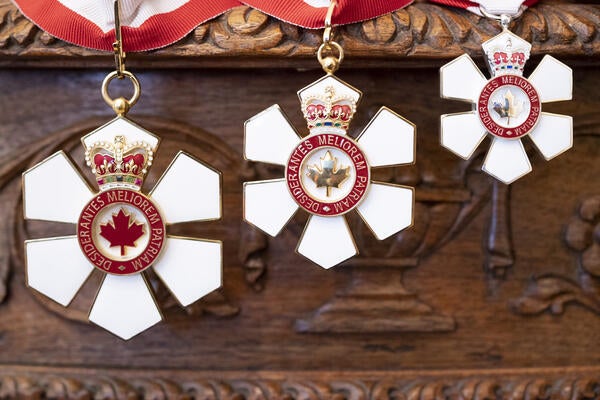
PODCAST: Reconciliation and Canada's legal system
Brad Regehr (BA '93) discusses reconciliation in the legal system and how he reconnected with his culture as an adult

Brad Regehr (BA '93) discusses reconciliation in the legal system and how he reconnected with his culture as an adult
By Abby Ollila and Megan Vander Woude Office of AdvancementListen to this episode or find it in your favourite podcast app
Brad Regehr (BA '93) was working at the Turnkey Desk when a friend stopped by holding an LSAT study guide. That's the first time he considered becoming a lawyer.
A grandchild of a residential school survivor, and a survivor himself of the Sixties Scoop, Brad has worked in Indigenous law for more than 20 years. In the fall of 2020, he was named president of the Canadian Bar Association—the first Indigenous president in the organization's 124-year history.
Brad is a member of the Peter Bellantyne Cree Nation in Saskatchewan, and in this episode you'll hear his conversation with Abby Ollila, a current history student at Waterloo. They discuss how he reconnected with his identity and culture, and what the future holds for Indigenous rights in Canada.

Listen to this episode or find it in your favourite podcast app
(3:51): Brad shares the events that pushed him to learn about his identity
(6:30): How Brad found and met his birth family
(9:28): The value of a supportive professor
(10:57): "Never ever did I think I would be a lawyer."
(11:52): Brad decided to write the LSAT during his shift at the Turnkey Desk
(13:50): Waterloo's History Department and the freedom to pursue his interests in Indigenous history
(14:41): Brad explains how he got involved with the Canadian Bar Association (CBA)
(17:14): Brad's priorities as president of the CBA
(18:28): How can the legal system move toward reconciliation?
(19:17): How have Indigenous legal traditions been recognized in the past?
(21:27): Canada has three legal traditions, not two
(23:15): Brad sees positive changes and a desire to learn
(24:48): Abby asks about the Haldimand Tract—a case that directly affects our community
Land Acknowedgements: Watch a video about the purpose and importance of land acknowledgements.
Haldimand Tract:
Native Land: Use this map to learn more about the land you live on, and who lived there before you.
Sixties Scoop: Learn about Canada's history of child apprehension and its lasting effects.
Oka Crisis:
Meech Lake Accord:
The Every Lawyer podcast: Listen to Brad and past presidents on the CBA podcast.
Law's Indigenous Ethics: As recommended by Brad, John Burrow's latest book examines the revitalization of Indigenous peoples' relationship to their own laws and attempts to enrich Canadian constitutional law more generally.
Truth and Reconciliation Commission (TRC) calls to action: Read the calls to action from the 2015 report.
Find more resources to continue your learning.
At the University of Waterloo, our work takes place on the traditional territory of the Neutral, Anishinaabeg, and Haudenosaunee peoples. Our main campus is situated on the Haldimand Tract, the land granted to the Six Nations that includes six miles on each side of the Grand River.
Since we recorded this episode in May 2021, non-Indigenous Canadians have been forced to reckon with some of the horrific actions of our past. We encourage alumni to learn more about the true and full history of the land they live on, and the people who lived there before them. We also encourage alumni to learn more about the Haldimand Tract: the land where they likely studied and lived as students.

Insignia for Companion, Officer and Member of the Order of Canada. (Photo credit: Sgt Johanie Maheu, Rideau Hall © OSGG, 2019.)
Read more
Alumni and honorary alumni recognized for shaping Canada’s health, policy, justice and financial sectors

Read more
Meet five exceptional Waterloo graduate students crossing the convocation stage as Class of 2025 valedictorians

Read more
Twenty-six researchers receive federal funding to drive discovery, innovation and research infrastructure development
The University of Waterloo acknowledges that much of our work takes place on the traditional territory of the Neutral, Anishinaabeg, and Haudenosaunee peoples. Our main campus is situated on the Haldimand Tract, the land granted to the Six Nations that includes six miles on each side of the Grand River. Our active work toward reconciliation takes place across our campuses through research, learning, teaching, and community building, and is co-ordinated within the Office of Indigenous Relations.